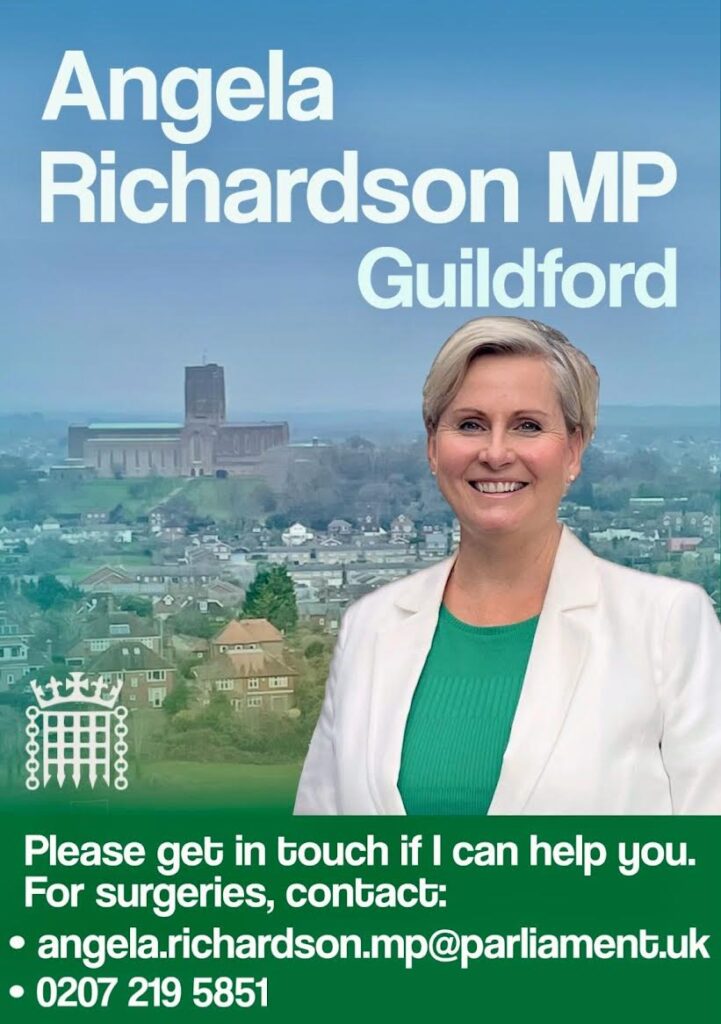 Abraham Lincoln
If given the truth, the people can be depended upon to meet any national crisis...
Abraham Lincoln
If given the truth, the people can be depended upon to meet any national crisis...
 Guildford news...
for Guildford people, brought to you by Guildford reporters - Guildford's own news service
Guildford news...
for Guildford people, brought to you by Guildford reporters - Guildford's own news service
Dragon Interview: Anne Milton Speaks About Her New Role and Guildford Housing
Published on: 29 Oct, 2017
Updated on: 29 Oct, 2017
When the Guildford result of the general election was announced in June, Guildford’s MP, Anne Milton, who had retained her seat and the majority of the popular vote, said that housing was the most important issue facing Guildford.
The Guildford Dragon NEWS has managed to catch up with the busy government minister to question her about this and her new appointment as a minister at the Department of Education…
How are you finding your new role as Minister of State for Skills and Apprenticeships?
I am thrilled with this new role as I feel particularly strongly about making sure there are opportunities for people who don’t feel university is the right route for them or maybe didn’t get the grades in their exams to get on to the next level. Of course, this is important not just for young people but people of all ages. I believe increasing the country’s skills levels is also an important priority for this government.
Do you miss your role as Deputy Chief Whip? What did you learn from that role?
I never miss what I leave – just look forward to new challenges. I learnt a great deal being deputy chief whip – about how Parliament works, about how to bring people together and I also had to help people with a number of problems in both their personal and political life. Dealing with people at times of adversity is often a humbling experience.
You said at the election that the most important issue facing Guildford is: “Housing: how many houses, where they should be built and what sort, plus the infrastructure required to go with them. And that’s true of Guildford and Cranleigh.” Is that still the case?
That’s still the case but you can’t look at new homes without considering the infrastructure shortfalls that we face. I have spent a lot of time with ministers from the Departments of Local Government and Transport, bringing along the leaders of Guildford Borough Council, to make sure they understand the problems we face; and of course, infrastructure isn’t just about transport – it’s about water, flooding, our environment and having enough schools and healthcare.
There has been much controversy over plans to include large housing developments in Guildford Borough’s green belt. What do you think about those proposals?
I think we need more housing and it must be the right sort of housing and it must be built in the right place. We need to concentrate first on using brownfield land, and on making better use of land where there is building already – there are areas in Guildford where best use has not been made.
Government ministers have consistently made clear the importance they attach to our precious green belt, where inappropriate development can only be justified in very special circumstances. We have local constraints (the A3, the railway line, green belt and Areas of Outstanding Natural Beauty) which affect where we can and should build.
How could more brownfield development, which, as you say, we are told is a priority, be encouraged?
The sequential test applied to planning applications, demonstrating that there are no other and better sites, helps to keep developers and planning officers aware of brownfield sites in particular. There can be a major cost involved if brownfield land is contaminated by its previous use.
There are incentives already available: Guildford was awarded £7.5 million of Government Housing Zone funding for exactly this purpose, towards the cost of the Slyfield Area Regeneration Project (SARP).
Will houses costing 80% of the average price in the borough be truly “affordable”?
Affordable to whom? There is no doubt that 80% of average house prices (around £508,000 for Guildford and around £430,000 in Cranleigh) is still unaffordable for many people. We should think about houses to buy and homes to rent when we consider what is affordable.
Guildford is a popular place to live – it is an attractive town in an ideal location for people and businesses, as well as the university and other colleges. I want to see affordable homes which remain affordable, and more imaginative ways to make the rental market and social housing more responsive to need. Many MPs in Surrey have lobbied government ministers about this and I certainly will continue to do so.
Isn’t the only way to provide housing for the less well off, younger generation in Guildford through social housing?
Social housing is an important part of provision. I spent 15 years working with social housing providers before I went into politics. The issues around allocation and provision are much more complex than people realise. We must never forget provision for those who are homeless and those who need supported housing.
Young, single people applying to the council for housing will find themselves in a lower priority bracket: they can usually be more flexible about where they live and have no dependents, so they are considered to have less priority than families with children and people with disabilities and medical problems. There needs to be a place for them in the housing provided, but social housing should not be a blanket reaction.
There is certainly no one solution and no easy solutions. We need the right mix of homes to rent and buy to make sure we need the substantial housing needs we have. We need homes for all our children and grandchildren.
Do you have confidence in the OAN [Objectively Assessed Need] based, as it is, on a black box formula that none of us is allowed to see?
The figure we can have certainty about is the housing waiting list. Beyond that, if people understood the basis for the OAN they would have more confidence in this as an expression of housing need.
House prices, and also rents, are very high and the assumption is that a shortage of property keeps these figures high. In practice, I do suspect that prices would come down if more homes were built but I do not know how great an impact this would have.
Do you think that the number of houses being proposed, around 13,000, can be built without exacerbating Guildford infrastructure problems and changing the current 89% green belt character of the borough?
Like any other town, Guildford must evolve, it cannot remain exactly the same – but you are right to refer to its character, which is why it is special to us all. It is therefore essential that decisions about where, and how many, homes to build are made for the benefit of residents in the short term as well as for our children and our grandchildren.
We need homes, and I have always said that getting the infrastructure right is a crucial part of Guildford’s future. This is not just about roads and the A3, but better train services, more and safer cycle routes – and the much wider requirements of a town and its population: education, health, religion, retail.
Isn’t the truth that local authorities have lost control over the number of houses that will be built in their areas of responsibility?
Local authorities where the Local Plan is properly used to identify where and how many homes to build, with justifiable proposals, should be places where residents and the elected councillors who represent them can have confidence in achieving what is right for their area. The government’s responsibility at a strategic level is to ensure that there are enough homes to house the country’s population. The challenge is to find the balance between delivering what we need within local constraints.
Responses to Dragon Interview: Anne Milton Speaks About Her New Role and Guildford Housing
Leave a Comment Cancel replyPlease see our comments policy. All comments are moderated and may take time to appear.

See Dragon story: GBC’s Explanation of Major Land Sale Notice Error ‘Borders on Arrogant’ Says Councillor




Recent Articles
- Notice: Exhibition – Ripley – World Famous Cycling Mecca
- Volunteer Organisers for the Poppy Appeal Urgently Needed
- ‘Damning’ Report Debated at Council Meeting – CEO Calls for Councillors to Come Together
- Surrey Children’s Services Improvement Recognised by Ofsted
- Independent Guildford Stationers Are ‘Top of the Shops’
- Birdwatcher’s Diary No.304
- Cyclist Dies in Peaslake
- Surviving Strategic Director Quits to Take Up CEO Role with a West Sussex Council
- Letter: Damning Reports Should Not Be Used to Gain Political Advantage
- New Leader of the Opposition at Waverley


Recent Comments
- Olly Azad on Mistreated Former Sub-postmasters Receive Standing Ovation
- Barry Jutsum on Letters, Comments, Complaints Policy and Privacy Statement
- Aubrey Leahy on Guildford Police Station to Close – Officers to Move to Mount Browne HQ
- John Ferns on Guildford Police Station to Close – Officers to Move to Mount Browne HQ
- Barry C Williams on Letter: Cross-party Effort Required to Improve Police Resourcing in Surrey
- Anthony Mallard on Guildford Police Station to Close – Officers to Move to Mount Browne HQ
Search in Site
Media Gallery
Dragon Interview: Local Artist Leaves Her Mark At One of England’s Most Historic Buildings
January 21, 2023 / No Comment / Read MoreDragon Interview: Lib Dem Planning Chair: ‘Current Policy Doesn’t Work for Local People’
January 19, 2023 / No Comment / Read MoreA3 Tunnel in Guildford ‘Necessary’ for New Homes, Says Guildford’s MP
January 10, 2023 / No Comment / Read More‘Madness’ for London Road Scheme to Go Ahead Against ‘Huge Opposition’, Says SCC Leader
January 6, 2023 / No Comment / Read MoreCouncillor’s Son Starts Campaign for More Consultation on North Street Plan
December 30, 2022 / No Comment / Read MoreCounty Council Climbs Down Over London Road Works – Further ‘Engagement’ Period Announced
December 14, 2022 / No Comment / Read MoreDragon Interview: GBC Reaction to the Government’s Expected Decision to Relax Housing Targets
December 7, 2022 / No Comment / Read MoreHow Can Our Town Centre Businesses Recover? Watch the Shop Front Debate
May 18, 2020 / No Comment / Read More







Jim Allen
October 29, 2017 at 3:07 pm
The challenge is to find the balance between need (not want) and local constraints which currently have not been taken into consideration in any respect clogged sewers hidden under our streets is a health risk, clogged streets serve no purpose and clogged air above the streets will eventually kill us all.
Disclosure of the OAN is truly the most important thing to gain the trust of the public – no one accepts an hourly rate of pay taken out of context with the occupation, no one goes to the most expensive petrol station. Guildford should not go the highest house number simply ‘because’.
Ben Paton
October 29, 2017 at 4:05 pm
How to summarise this?
“I am thrilled with my new role…”
“I never miss what I leave…”
“…you can’t look at new homes without considering the infrastructure shortfalls that we face..”
“The sequential test applied to planning applications”
“There can be a major cost involved if brownfield land is contaminated by its previous use”
“We should think about houses to buy and homes to rent when we consider what is affordable.”
“Guildford is a popular place to live..”
“The figure we can have certainty about is the housing waiting list”
“We need homes for all our children and grandchildren”
“Like any other towns, Guildford must evolve…”
“Local authorities … should be places where residents and the elected councillors who represent them can have confidence in achieving what is right for their area.”
What a lot of facile platitudes.
This is about as informative as Diane Abbot on Labour’s spending plans.
Where does the MP stand on the West Surrey SHMA? Its housing model has not been disclosed in Guildford, Waverley or Woking – on the pretext that it is commercially sensitive. Should Guildford now disclose it?
Why doesn’t the draft Local Plan apply a sequential test to development sites?
How much has the housing waiting list has fallen in each of the last three years?
Why is the Guildford OAN not constrained?
Perhaps Sir Humphrey Appleby came out of retirement to ghost this piece. He just forgot his pet phrases: “…in the fullness of time”, “once we have had time to consider all the options” etc.
John Perkins
October 31, 2017 at 11:11 am
When Anne Milton says: “if people understood the basis for the OAN” is she agreeing that people should be told that basis?
When she says: “the assumption is that a shortage of property” keeps prices high, does she mean that the OAN has not identified a definite link? If not, why not? She “suspects” prices would come down if more homes were built, but surely there would be no need for suspicion if the reasoning behind the OAN were known.
Assumption and suspicion should not form part of an objective assessment. Understanding should, but there can be no understanding where secrecy prevents it.
Harry Eve
October 31, 2017 at 5:22 pm
The problem seems to be the unelected M3 LEP having undue influence on local authorities and trying to force excessive growth in the South-East, denying other parts of the country, that have empty homes, the opportunity for regeneration.
The imbalance in expenditure was highlighted in a Channel 4 programme on Monday: Is Britain Full? Those who push for excessive growth in the South East are, in effect, denying employment opportunities to young people in other parts of the country – leaving them with little option but to head south for a career.
David Smith
October 31, 2017 at 7:24 pm
It’s a shame (but not unexpected) that her answers are all a little vague – when she talks about green belt expansion there is no comment as to whether she is for or against this – she just states that we need “right sort of housing and it must be built in the right place” – what does this mean?
I think we all know now that Guildford cannot simply rely on building hundreds of flats and it would be inappropriate to use what few brownfield sites we have left in the town centre for houses. Is this, therefore, a nod to green belt development?
Mary Bedforth
November 3, 2017 at 9:25 am
…”having enough schools and healthcare”…..
But what’s left of “healthcare” following the introduction of the Health and Social Care Act 2012 in which Guildford’s MP played a part when she was a junior health minister under Lansley? He went off to join Bain & Co and the privatisation of our NHS increases all the time.